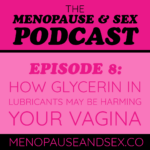Episode 8: How Glycerin in Lubricants May Be Harming Your Vagina

Today’s episode is brought to you by nectar personal moisturizer personal lubricant from wet orchid made with menopause in mind this personal lubricant has hyaluronic acid. Containing no parabens no glycerin no harsh ingredients. Never sticky! Go to wetorchid.com/nectar to learn more about this product.
So I would like to talk about personal lubricants for the year of making sexual activity more comfortable and let’s talk about this Hello hello today’s episode is brought to you by hello hello today’s episode is going to center
Glycerin is a common ingredient in many lubricants and personal care products, including those used for vaginal lubrication. While it generally does not cause harm to vaginal tissues, some individuals may have sensitivities or allergies to glycerin, which can lead to irritation or inflammation.
In people with sensitive vaginal tissues, glycerin may disrupt the natural balance of the vaginal microbiota, leading to an increased risk of developing infections such as yeast infections or bacterial vaginosis. This is because glycerin can provide a food source for certain microorganisms, potentially altering the pH and creating an environment that is conducive to their growth.
Additionally, glycerin has a high osmolality, meaning it attracts water molecules. When applied to the vaginal tissues, this can draw out moisture, potentially causing dryness or dehydration. This can lead to discomfort, itching, and increased vulnerability to irritation or injury.
According to https://www.ncbi.nlm.nih.gov/pmc/articles/PMC3948026/
Mucous membranes in the vagina and vulva rapidly absorb chemicals without metabolizing them. But until recently scant research existed on how chemicals in feminine hygiene products and personal lubricants may affect women’s health.
Hitchcock and Alexander soon initiated research programs on vaginal physiology, immunology, and microbicides, eventually funding Cone’s work. These new programs led to groundbreaking discoveries in animals and humans that certain chemicals—including glycerin (glycerol), a common base for personal lubricants—can damage or irritate vaginal1 and rectal2 epithelial cells, potentially increasing the transmission of STIs such as herpes and human immunodeficiency virus.
Did you know that many common lubricants contain 40% and more glycerin! Try a lubricant made with menopause in mind, try Nectar by Wet Orchid.